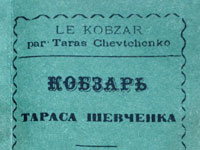 Among the many editions of "Kobzar" by T.H. Shevchenko there is one that draws attention. His first miniature edition of 1000 copies was printed in Geneva 1878, format 55 x 85 mm, in Ukrainian. It was printed in printing house "Community." This printing house was grounded by M.P. Dragomanov, who, having emigrated from the Russian Empire, printed illegal works by Ukrainian scholars and writers. His anthology "Community" was printed 5 times in the period from 1878-1882 and has become a renowned social and political issue abroad. It popularized works by P.Myrnyi, T.Shevchenko, M. Pavlik, S. Podolynskyi, F. Vovk, M. Drahomanov, I. Franko and others.
Among the many editions of "Kobzar" by T.H. Shevchenko there is one that draws attention. His first miniature edition of 1000 copies was printed in Geneva 1878, format 55 x 85 mm, in Ukrainian. It was printed in printing house "Community." This printing house was grounded by M.P. Dragomanov, who, having emigrated from the Russian Empire, printed illegal works by Ukrainian scholars and writers. His anthology "Community" was printed 5 times in the period from 1878-1882 and has become a renowned social and political issue abroad. It popularized works by P.Myrnyi, T.Shevchenko, M. Pavlik, S. Podolynskyi, F. Vovk, M. Drahomanov, I. Franko and others.
Why did the idea to publish a miniature works of Shevchenko appear? The reason became an infamous circular by interior minister P.Valuyev that has forbidden to print books and periodicals, stage theatrical performances "in Ukrainian dialect". This ban was reaffirmed also by the so-called Ems decree in 1876 by Tsar Alexander II. He "did not allow imports in the Empire without a special permission of The Head Management for Printing books and pamphlets printed abroad in Ukrainian."
A complete ban on Ukrainian language, which until 1905 was not even recognized as a Slavic language, artificially hampered its development. Ukrainian scientists, scholars opposed to this law and they facilitated the printing of the socially-political, artistic, scientific literature in Ukrainian language. It is the printing house "Community" that made the preparation and publication of Geneva "Kobzar" by T. Shevchenko possible. Theodore Wolf – a Ukrainian anthropologist, archaeologist, ethnographer, folklorist and professor at the Kiev University and Anton Lyahotskyy (alias "Kuzma") - a known Ukrainian typographer who took an active part in the public life of the Ukrainian emigration took an important part in printing illegal literature.
While preparing publications, F. Wolf chose twenty most antimonarchic and antislave, prohibited by the Empire works of the poet. One poem called “My dear God, again disaster” was published for the first time. Others were not published in Russia until after the 1905 revolution. There were also those who though published in Russia were destroyed by censorship.
The question arose of how to bring a book to Russia, bypassing customs borders. The solution was found: transporting books together a package of tissue paper "Awadi", which enjoyed great demand among smokers around the world and was sold in Russia. Miniature size "Poet" had a Package Size of 55 x 85 mm. Each booklet was wrapped in tissue paper and put between the real package of paper so that even when if opened, a book parcels could not be distinguished from real paper. So all parcels of precious contribution passed customs borders and were promptly taken to the Ukraine on the anniversary of Taras Shevchenko. Collection included not only "seditious" poems by Shevchenko.
This edition is supplemented by compilers with important applications. Instead, the title gave devotion "Our countrymen in Ukraine - on the anniversary of Shevchenko; February 26, 1878 - Kuzma and Sirko publishers." On the next page they reprinted humiliating Ems Act 1876 unchanged. Only to the signature "Chief of the main management of press issues Grigoriev " publishers ironically added: "University Professor". After they placed the preface of the life and work of the poet, written by F. Wolf.
The publication was a remarkable event. Franko responded well to it, "this miniature" Kobzar " made a great sensation in Galicia and thousands of copies were shipped to Russia as the copies could be hidden in a pocket."
Thus, Geneva "Kobzar" was a unique edition in the series of "Kobzar" of various periods.
